The Independent's journalism is supported by our readers. When you purchase through links on our site, we may earn commission. Why trust us?
Fans vs air conditioners: Which one is right for you when it comes to cooling your home?
It’s getting hot in here, so we’ve broken down the differences between the two room-cooling solutions
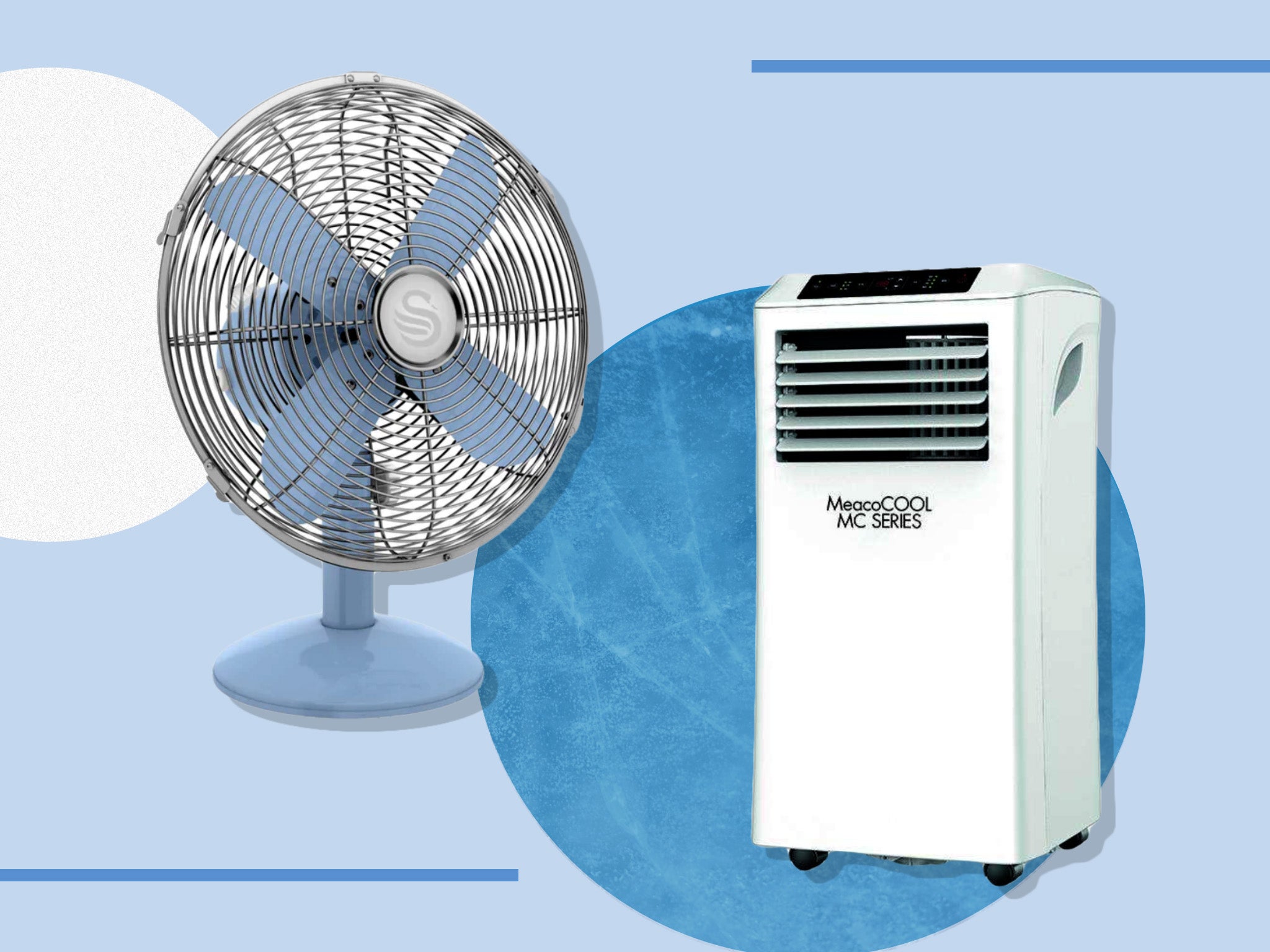
Your support helps us to tell the story
From reproductive rights to climate change to Big Tech, The Independent is on the ground when the story is developing. Whether it's investigating the financials of Elon Musk's pro-Trump PAC or producing our latest documentary, 'The A Word', which shines a light on the American women fighting for reproductive rights, we know how important it is to parse out the facts from the messaging.
At such a critical moment in US history, we need reporters on the ground. Your donation allows us to keep sending journalists to speak to both sides of the story.
The Independent is trusted by Americans across the entire political spectrum. And unlike many other quality news outlets, we choose not to lock Americans out of our reporting and analysis with paywalls. We believe quality journalism should be available to everyone, paid for by those who can afford it.
Your support makes all the difference.Temperatures are soaring across Britain and our homes are heating up. We’re stuck in a pressure cooker of misery and sweat, desperately searching for some cool respite. But while we close the windows, shut the curtains and hunker down inside the bathroom in a ball of tears, inevitably screaming “No, no! It burns”, we need something more.
Breathable bedding, ice cream and face mists will help keep us all comfortable, and are must-have heatwave essentials, but they frankly aren’t going to circulate the air or cool our homes down in any significant way.
If you’re really feeling the heat this summer, it’s time you invested in some actual home-cooling equipment. The two main options are an electric fan or a portable air conditioner. You’ve no doubt already got a fan lying around, the house, the question is: should you upgrade to a portable air conditioner this summer instead?
With heatwaves worsening and becoming more intense and more likely to take place due to climate change, experts are warning the country that we need to start heat-proofing our homes.
There are lots of things to consider when choosing between an electric fan and a portable air conditioner. Is one more effective at cooling a room than the other? How much do they each cost to buy and run? And which one is easier to use? Well, we’re here to help break all that down for you, and more.
Read more:
Fans vs air conditioners: How do they each work and which is more effective at cooling the room?
While both fans and air conditioners work to cool you and your home down, they each do so in a different way, and one is more effective than the other.
First of all, electric fans don’t actually cool the air inside your home like portable air conditioners do, they just cool you down. They do this by pushing the air in the room around, helping the sweat and moisture on your skin evaporate more quickly. The air being circulated by a fan is the same temperature as the air in the room, so while it does provide a current of air, when it’s a particularly hot day, you’ll just be blowing around hot air. You might not feel any cooler.
Portable air conditioners physically lower the temperature inside your home rather than creating an air current. It does this by sucking up the hot air in the room, cooling that air down and then expelling the hot air through an exhaust hose into the outside world. Air conditioners with higher British Thermal Units (BTUs) will be more efficient at cooling larger rooms – the higher the BTU, the larger the room it can cool. If you buy a portable air conditioner with a BTU that’s too low, it won’t work as efficiently.
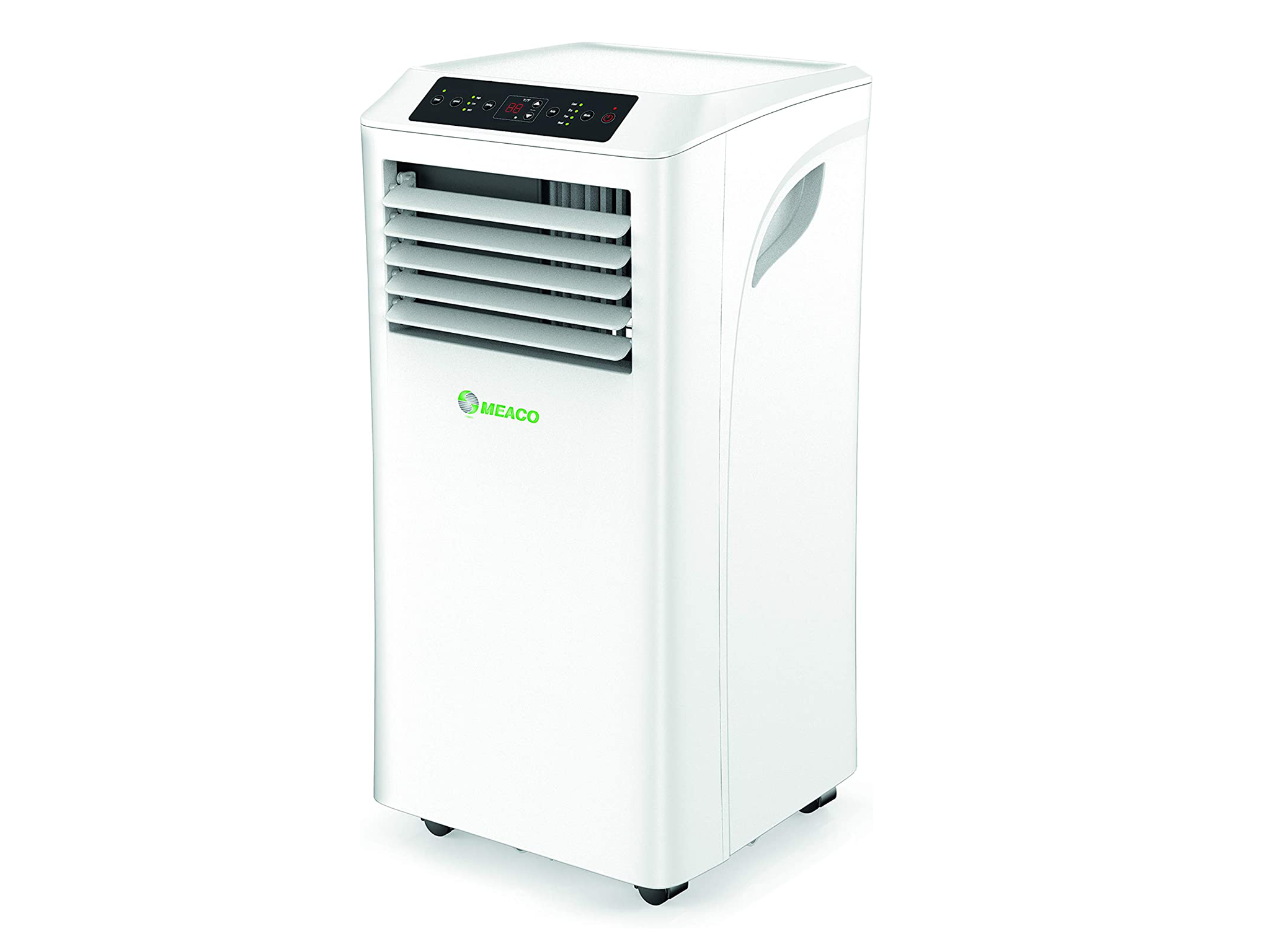
On extremely hot days, a portable air conditioner, such as the MeacoCool MC series 7000 (£299.99, Amazon.co.uk) will be more effective at cooling an entire room because it will literally be removing the hot air in order to keep the temperature down.
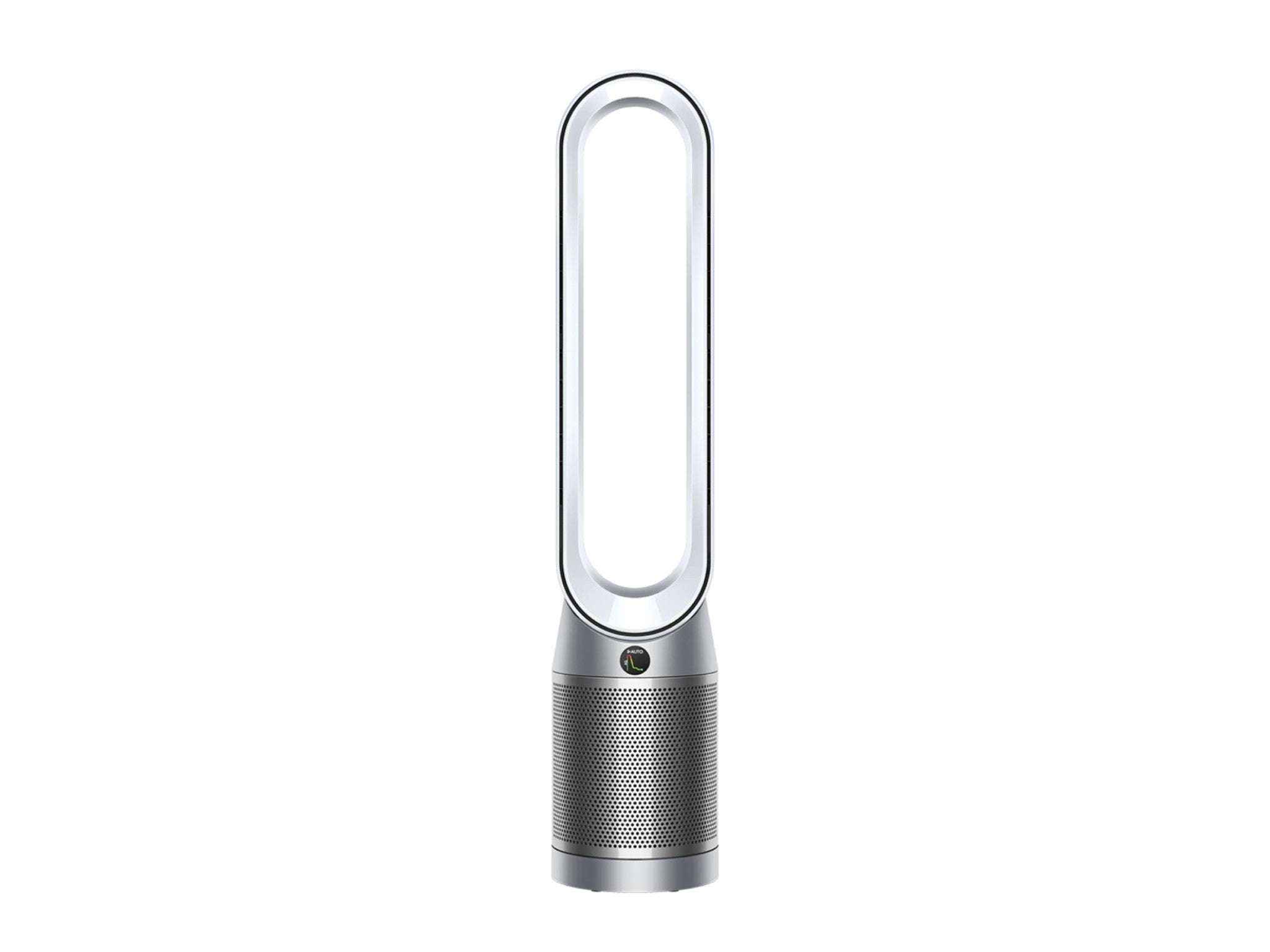
A large, powerful tower fan, such as the Dyson purifier cool autoreact (£399.99, Johnlewis.com) or a ceiling fan with fast rotating blades will help circulate the air in a wider spread, providing a stronger breeze around the entire room, but it won’t actually sap the hot air out of your home.
Fans vs air conditioners: Which one takes up more room and which is more portable?
Electric fans win this one, hands-down. Handheld fans, desk fans, tower fans and even pedestal fans take up far less room than even the smallest portable air conditioners with the lowest BTUs.
While portable air conditioners are technically portable, with powerful models such as the MeacoCool MC 14000 (£479.95, Amazon.co.uk) featuring casters to help you move it around to other rooms, they’re still bulky, heavy and take up a lot of room in your home. And even our favourite portable air conditioners weighed between 20.5kg and 32kg.
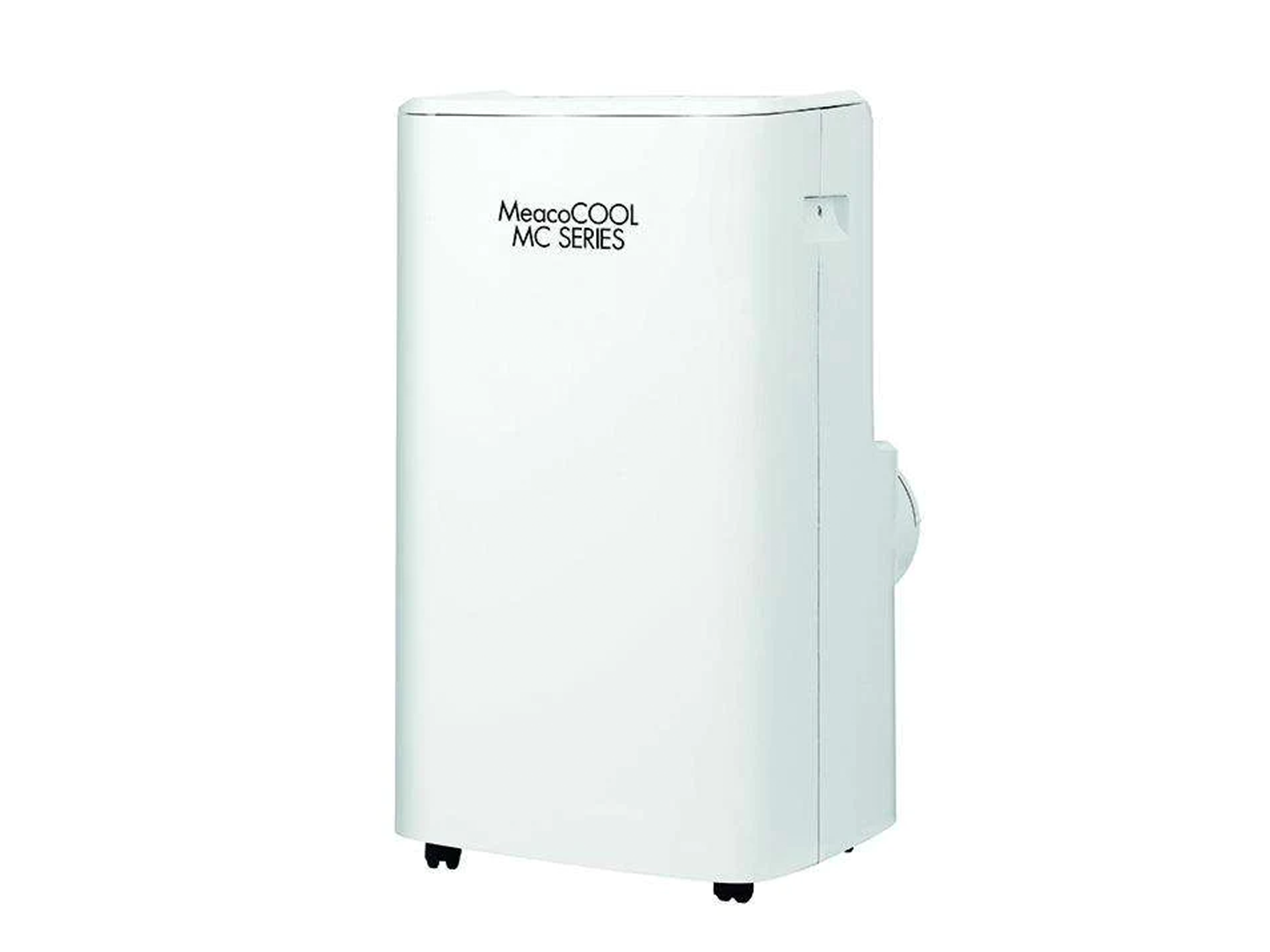
You also need to think about the exhaust hose, which needs to be threaded out of a window, and that can be a cumbersome, unwieldy process, especially if you’re using a window seal around the hose for maximum energy efficiency.
Fans, on the other hand, are light and can be neatly packed away when not in use, plus you can easily pick one up if you want to move it to another room. The best fans in our round-up weigh as little as 1kg and as much as 5kg. Good luck trying to hide your portable AC unit in the winter.
Fans vs air conditioners: Which costs more to run and how much energy does each use?
Most fans in the UK use between 70W and 150W of power. According to research conducted by price comparison site Uswitch, a 120W electric fan will cost you 2p an hour when its running.
Portable AC units cost around 44p per hour to run. If you use your air conditioner for 4 hours and 18 minutes during the day – the UK average – and 4 hours and 48 minutes at night, it’s estimated that you’ll pay roughly £28 per week.
We’d recommend investing in a smart AC controller, such as the Tado smart AC control V3+ (£74.98, Amazon.co.uk) if you’re going to install a portable air conditioner in your home as this will help you manage and control your unit so that it runs more efficiently.
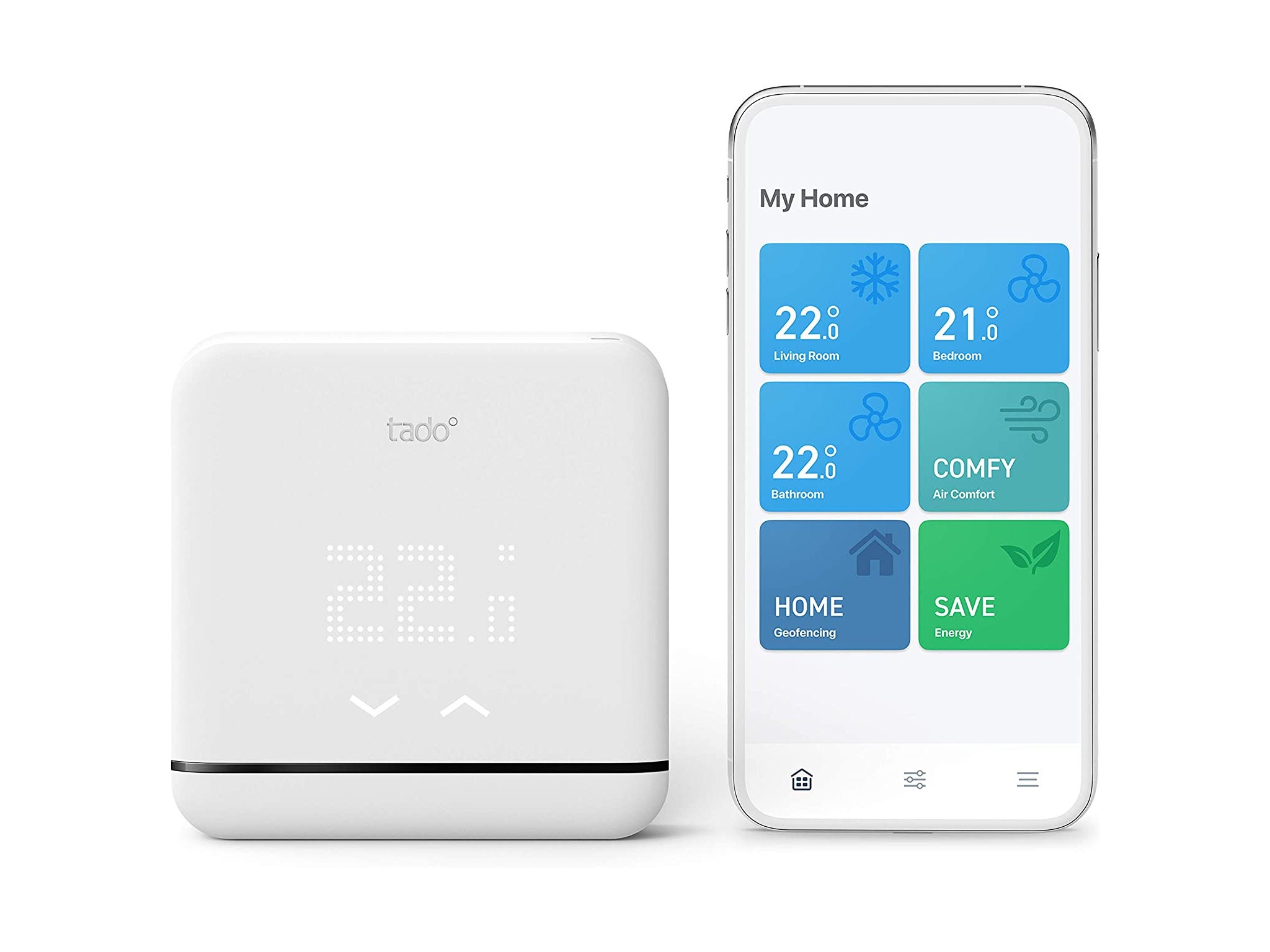
You also have to think about the cost of the appliance itself. The most expensive fan on our round-up of the best electric fans costs £399.99, while the cheapest desk fan costs £29.99. The most expensive portable air conditioner on our round-up of the best portable AC units costs £949, while the cheapest costs £289.54.
Fans are cheaper to buy and cheaper to run, but that might mean very little when you’re struggling to work and sleep in the heat. Still, it’s something to keep in mind, especially with the cost of living crisis looming large.
Read more: 10 best summer duvets to keep you cool even on the balmiest nights
We’d also advise keeping an eye on the energy rating when buying a portable air conditioner. “A” is the most energy efficient and “G” is the least energy efficient, so air conditioners with an A rating will be cheaper to run.
Fans vs air conditioners: Which one is easier to use?
Pedestal and desk fans are a lot easier to use than portable air conditioners, but that’s typically because they do fewer things. With a fan, you usually just need to plug it in and choose your speed level. Portable air conditioners are a bit more difficult to use for two reasons.
Firstly, you need to attach a hose to the back of the air conditioner and thread it out of the window so that the hot air can be extracted out of your room. This means that your window needs to be close to a plug outlet, otherwise you’ll have a few problems stretching the hose out of the window. You also need to use a window seal to help stop air from flowing back into your room when it’s on, or it’ll cool your place down more slowly and be less efficient overall.
Secondly, portable air conditioners generally have more features packed into them – from sleep modes and timers to settings for dehumidification and heating, you can just do more with a portable AC unit than you can with a floor fan.
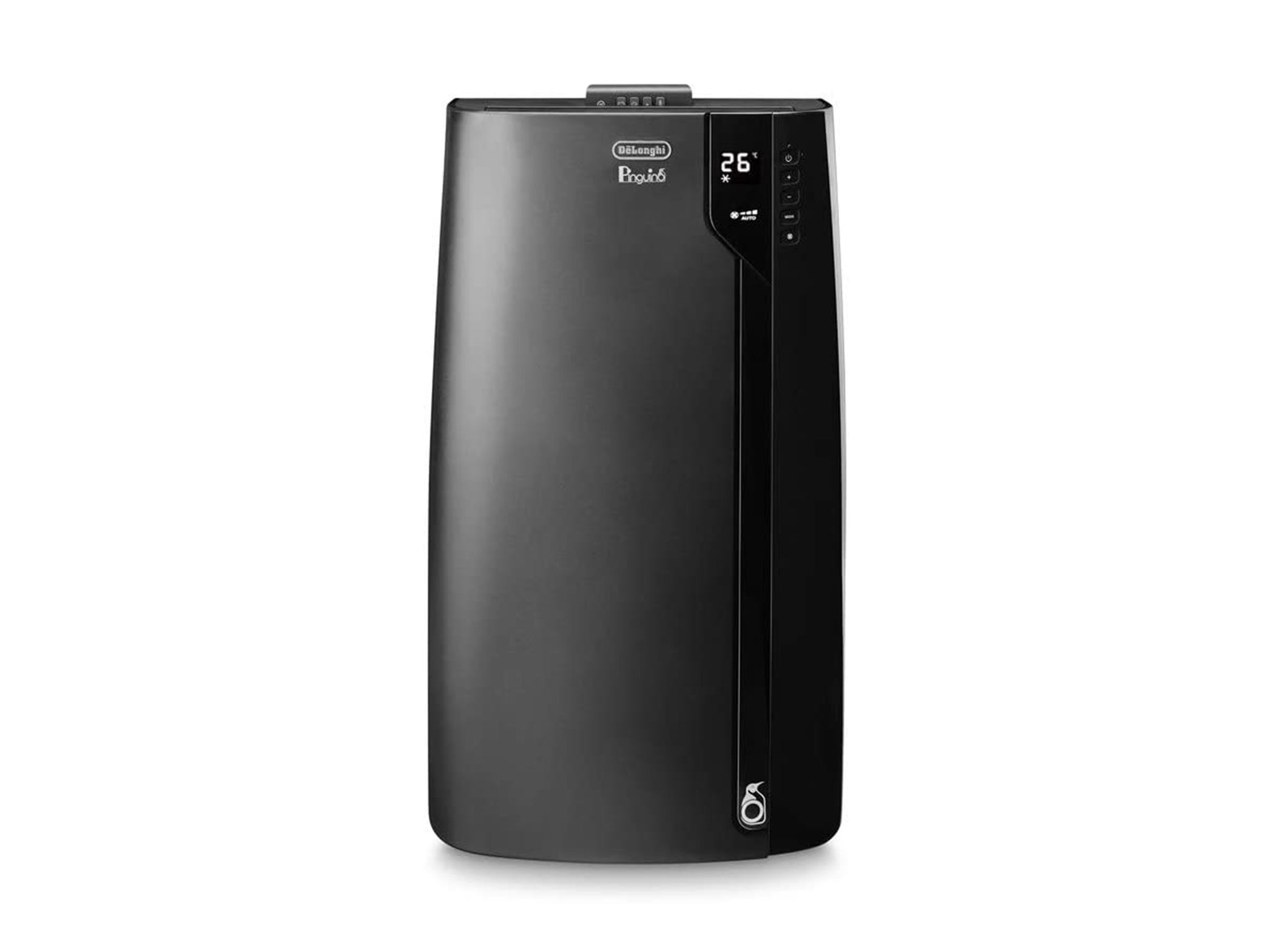
Our favourite DeLonghi portable air conditioner with 11,500 BTUs (£819.99, Amazon.co.uk) for example, includes a remote for you to tweak the temperature, the fan speed and programme the timer. It also has a dehumidifier function and a light indicator, letting you know if conditions are uncomfortable, acceptable or optimal.
Fans vs air conditioners: Do you need to clean either one?
You should be cleaning an electric floor or desk fan once every three to four months, but considering most Brits will only be using a fan during the summer months, it’s worth giving a clean when you take it back out for the summer to remove any dust from the blades.
Portable air conditioners need to be cleaned much more frequently than desk and floor fans. It’s recommended that you clean the air filters once every two weeks. It’s quite common for dust to collect on top of the filters, and this can restrict the airflow, reducing the efficiency of the machine. There are usually two filters – one at the top and one at the bottom of the portable unit. Both need to be removed and cleaned. Obviously, more maintenance is required with an air condition system than a fan.
What are the different types of fan?
Unlike portable air conditioners, which are largely the same whatever model you choose, there are different types of fan out there, so what’s the difference between each one?
Read more: Fans with next day delivery UK and where to shop them for a quick cool-down
Tower fans are a popular option because of their slim design. They don’t feature rotary blades, so they aren’t usually as powerful as bladed fans, but they look nicer and also offer up more features such as air purification. Pedestal fans are bladed and can be placed behind furniture. They’re stronger because they essentially use propellers to circulate the air. Most desk fans and portable fans use plastic rotary blades.
The verdict: Fans vs portable air conditioners
Each has their pros and cons. Portable air conditioners will actually extract hot air from your room and will work best when we’re experiencing extreme heat conditions. They are bulky, heavy and not very portable, however. Portable air conditioners are also fairly expensive, especially when buying a unit with higher BTUs, plus they cost a lot to run, so keep that in mind.
Fans on the other hand don’t extract heat from a room, instead circulating the air to help evaporate sweat more quickly. They don’t work as well during extreme heatwaves, but provide decent respite from the heat throughout the summer. They’re also more portable, cost less to run and are more energy efficient.
Ultimately it comes down to personal preference, but we hope that this helps you decide which will be best to help you beat the heat. Stay cool out there!
Voucher codes
For the latest discounts on household appliances, try the links below:
Keep cool this summer with the IndyBest team’s hot weather essentials, from fans to face mists